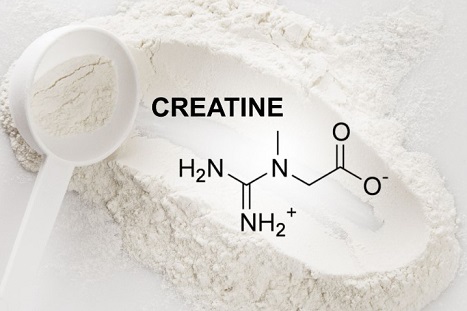Creatine Supplementation Found To Reverse Fatigue-Related Cognitive Deterioration Caused By Sleep Deprivation
Nikhil Prasad Fact checked by:Thailand Medical News Team Apr 29, 2024 1 year, 8 months, 3 weeks, 4 days, 21 hours, 2 minutes ago
Medical News: In the pursuit of optimal cognitive function, researchers continually investigate various avenues, including the role of dietary supplements. Creatine, a well-known supplement in the sports community for its ability to enhance physical performance, has recently garnered attention for its potential cognitive benefits. This
Medical News report delves into a study conducted by researchers at Forschungszentrum Jülich - Germany, exploring how a high single dose of creatine can reverse metabolic alterations and fatigue-related cognitive deterioration caused by sleep deprivation.
 Creatine Supplementation Found To Reverse Fatigue-Related
Creatine Supplementation Found To Reverse Fatigue-Related
Cognitive Deterioration Caused By Sleep Deprivation
The Role of Creatine in Cognitive Function
Creatine is a naturally occurring compound found in foods like meat and fish, and it plays a vital role in energy metabolism, particularly in tissues with high energy demands such as muscle and brain cells. While creatine has long been established as a valuable supplement for improving physical performance, recent studies have investigated its impact on cognitive function.
Understanding Sleep Deprivation and Cognitive Decline
Sleep deprivation is a common occurrence in modern society, driven by factors such as work demands, lifestyle choices, and sleep disorders. The consequences of sleep deprivation extend beyond fatigue and drowsiness, significantly impacting cognitive abilities such as attention, memory, and decision-making. Prolonged periods of inadequate sleep can lead to cognitive decline, affecting both performance and overall well-being.
The Study by Forschungszentrum Jülich
The study aimed to investigate the immediate effects of creatine supplementation on cognitive function during sleep deprivation. The researchers selected 15 test subjects who were subjected to overnight sleep deprivation and cognitive tasks. Prior to the cognitive testing, the participants received a high single dose of creatine.
Based on the hypothesis that a high extracellular creatine availability and increased intracellular energy consumption will temporarily increase the central creatine uptake, the subjects were orally administered a high single dose of creatine monohydrate (0.35 g/kg) while performing cognitive tests during sleep deprivation. Two consecutive 31P-MRS scans, 1H-MRS, and cognitive tests were performed each at evening baseline, 3, 5.5, and 7.5 h after single dose creatine (0.35 g/kg) or placebo during sub-total 21 h sleep deprivation (SD).
Immediate Cognitive Benefits of Creatine
The findings of the study revealed that a high single dose of creatine had immediate and significant effects on cognitive performance. Within three hours of creatine supplementation, improvements in brain metabolism and cognitive function were observed. These improvements peaked after four hours and lasted up to nine hours post-administration.
<
br />
The results showed that creatine induces changes in PCr/Pi, ATP, tCr/tNAA, prevents a drop in pH level, and improves cognitive performance and processing speed. These outcomes suggest that a high single dose of creatine can partially reverse metabolic alterations and fatigue-related cognitive deterioration.
Mechanisms of Creatine's Impact
Creatine's impact on cognitive function during sleep deprivation can be attributed to several mechanisms. Firstly, creatine enhances brain metabolism by increasing the availability of high-energy phosphates such as phosphocreatine (PCr) and adenosine triphosphate (ATP). These energy-rich compounds play a crucial role in neuronal function and synaptic transmission, contributing to improved cognitive performance.
Secondly, creatine supplementation during sleep deprivation prevents a drop in pH levels in the brain. Sleep deprivation is associated with increased acidity in the brain, which can impair neuronal function. Creatine's ability to stabilize pH levels helps maintain optimal conditions for cognitive processing and prevents fatigue-related cognitive deterioration.
Implications for Cognitive Enhancement
The study's findings have significant implications for cognitive enhancement, especially in situations where cognitive performance is challenged, such as during long working hours or periods of intense mental activity. Creatine supplementation could serve as a valuable tool to enhance cognitive resilience and performance under stressful conditions.
Considerations and Future Research
While the immediate cognitive benefits of creatine supplementation are promising, several considerations and areas for future research emerge. Firstly, optimal dosages and timing of creatine administration warrant further investigation to maximize its cognitive benefits while minimizing potential side effects.
Additionally, long-term effects of creatine supplementation on cognitive function and overall brain health require comprehensive study. Understanding how creatine influences neuroplasticity, neuroprotection, and neurotransmitter systems will provide valuable insights into its role as a cognitive enhancer.
Furthermore, exploring the potential synergies of creatine with other cognitive-enhancing interventions, such as cognitive training or nutritional strategies, could unlock additional benefits for cognitive performance.
Conclusion
In conclusion, the study by Forschungszentrum Jülich highlights the immediate cognitive benefits of creatine supplementation, particularly in mitigating the effects of sleep deprivation-induced cognitive decline. This research underscores the potential of creatine as a tool for cognitive enhancement and resilience, paving the way for further exploration and optimization of its use in various contexts where cognitive performance is crucial. As our understanding of creatine's mechanisms and effects continues to evolve, it holds promise as a valuable addition to strategies aimed at optimizing cognitive function and well-being.
The study findings were published in the peer reviewed journal: Scientific Reports.
https://www.nature.com/articles/s41598-024-54249-9
For the latest
Medical News, keep on logging to Thailand Medical News.
